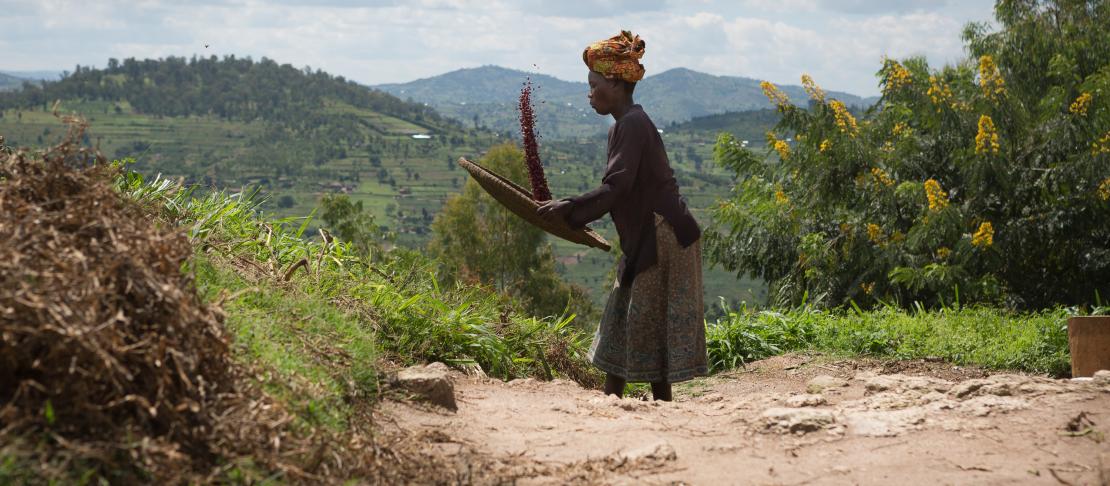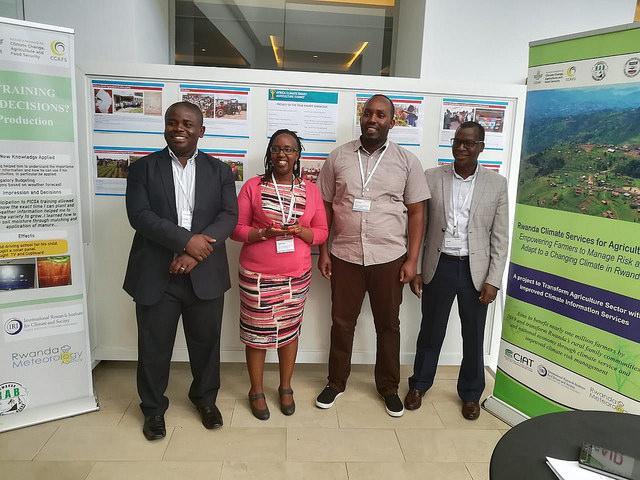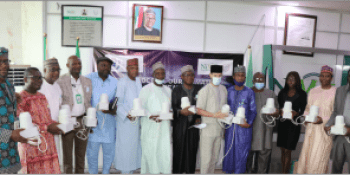Rwanda Climate Services for Agriculture project awarded the first ever Climate Smart Agriculture Project of the Year 2018

NAIROBI, May 18 — At the inaugural Africa Climate Smart Agriculture Summit 2018 held by the Aid & International Development Forum (AIDF), the Rwanda Climate Services for Agriculture project was announced as the winner of the first Climate Smart Agriculture Project of the Year Award.
The Climate Smart Agriculture Project of the Year Award 2018 recognizes outstanding projects that bring together multiple stakeholders in the agriculture ecosystem—from governments, donors, and NGOs to the private sector—to form new partnerships that improve productivity, resilience, and efficiency while lowering carbon output. Nominations were judged on a variety of factors, including creative approach to solving real challenges; proven impact and ability to demonstrate environmental, climate, social and economic impact; the longevity of the projects; and potential for self-sufficiency. The panel of judges included members from the Eastern Africa Farmers Federation, International Center for Tropical Agriculture (CIAT), United Nations Environment, and Aid & International Development Forum (AIDF). From more than 50 submissions, only 10 projects were shortlisted, and the list was released earlier in May 2018.
Project team being interviewed at the award ceremony. Photo: Alex Virero (CCAFS)
Funded by the United States Agency for International Development (USAID), led by the CGIAR Research Program on Climate Change, Agriculture and Food Security (CCAFS) and implemented by the International Center for Tropical Agriculture (CIAT), the Rwanda Climate Services for Agriculture project seeks to transform Rwanda’s rural communities and economy through climate risk management with an overall goal of improving agricultural planning and food security in the face of climate change.
Other project partners include the International Research Institute for Climate and Society (IRI), the International Livestock Research Institute (ILRI), the World Agroforestry Centre (ICRAF), the Rwanda Agriculture and Animal Resources Development Board (RAB), Meteo Rwanda, the University of Reading, Radio Huguka, DERN, N-Frnds, and Caritas (Caritas Kibungo, Caritas Butare and Caritas Kibuye).
We are so glad to win the first ever Climate Smart Agriculture Project of the Year Award during the #CSAAfrica Summit happening in Nairobi. @CIAT_ @CIAT_Africa @HarvestPlusRw @USAIDRwanda @FollowAIDF
Read more: https://t.co/XhjtyLClJi pic.twitter.com/x6zgA0lTfa— RCSAgriculture (@RwandaCSA) May 15, 2018
"Our collective work benefits from a particularly strong set of government and local and international partners and generous support from USAID at the level needed to strengthen Rwanda’s capacity to produce, deliver and use climate services. This investment of human and financial resources, and innovative solutions such as ENACTS and PICSA, have made it possible to make things that have previously only been demonstrated a pilot scale work for farmers on a national scale,” says Jim Hansen, leader of the CCAFS Climate Services and Safety Nets Flagship Program.
It is essential to build on local governance structures. For example, the hybrid of the 'Twigire Muhinzi' homegrown extension service system and PICSA, enables farmer champions in villages to rapidly reach a large number of farmers with weather and climate information to effectively inform farmers’ decisions at farm, household and community levels,” adds Desire Kagabo, CCAFS Rwanda Climate Services for Agriculture Project Coordinator based at CIAT.
Now about two-thirds of the way through the four-year project, there have already been significant accomplishments on several fronts. Building on the IRI’s Enhancing National Climate Services (ENACTS) approach, the project supported Meteo-Rwanda to fill gaps in its historical climate records, and use the new high-resolution data set to produce one of the most advanced suites of online climate information tools and products for agricultural decision-makers available in Sub-Saharan Africa.
The project is working with partners to integrate climate services into Rwanda’s national agricultural extension service, by training extension staff and volunteer farmers in a process known as Participatory Integrated Climate Services for Agriculture (PICSA). The trained agricultural extension personnel have led 75,000 farmers through the process of understanding local historical and forecast climate information and incorporating it into their farm and livelihood planning. The project also works with Radio Huguka, a rural radio station covering 75% of the country, to regularly broadcast weather information and innovative programming about its use for agricultural decision-making. Finally, the project has worked with Rwanda’s government and the World Meteorological Organization to develop a national climate services framework that will oversee and foster sustained coproduction, assessment and improvement of climate services.
Read more:
- Project factsheet: Rwanda Climate Services for Agriculture
- Press release: New program in Rwanda will transform agriculture through climate information and historic data reconstruction
- Website: Enhancing National Climate Services (ENACTS)
- Blog: PICSA training of trainers: strengthening national and local capacity for climate services for agriculture in Rwanda
For further information, please contact:
- Project Leader, James Hansen (CCAFS-IRI): jhansen@iri.columbia.edu
- Project Coordinator, Desire Kagabo: D.Kagabo@cgiar.org



